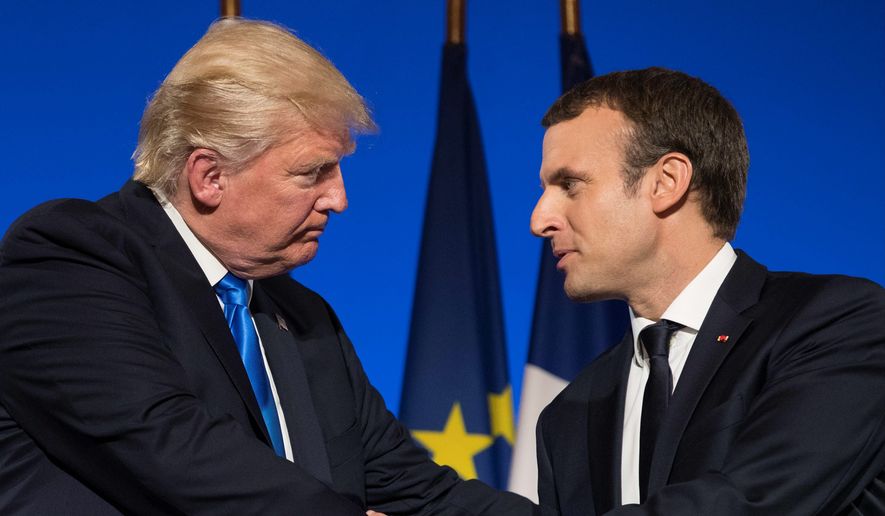OPINION:
The Donald finally caught a break in Paris, basking in rare Franco-American bonhomie as he joined the new president of France on Bastille Day, this year to celebrate the 100th anniversary of the American arrival on the battlefields of World War I.
A contingent of American troops even led the parade down the Champs-Elysees. Not even a president can resist a parade, especially a military parade with marching bands and serried ranks of fighting men. On Thursday, President Emmanuel Macron of France did not even try.
Neither did Donald Trump, once a schoolboy at a military academy. Regimental flags floating on a peaceful breeze, despised as nationalist symbols to some, are but reminders to all that “greater love hath no man than this,” in the words of Christ as recorded by the Apostle John, “that a man lay down his life for his friends.”
Few national leaders have traded such fierce hostility over so short a time than Messrs. Trump and Macron. When the two men met for the first time at a NATO summit two months ago, Mr. Macron seemed to avoid a Trump embrace, moving out of the way to greet other leaders first, a snub much remarked on.
When Mr. Trump announced that he would withdraw the United States from the Paris climate-change agreement, brokered in Paris, he employed a particularly sharp verbal elbow: “I was elected to represent the citizens of Pittsburgh, not Paris.” President Macron then released a video, in English, inviting U.S. scientists to live in exile in France, with a parody of the Trump campaign slogan, “Make Our Planet Great Again.”
This was forgotten this week in Paris, with both men eager to overlook past slights and snubs to get on with what binds the two fractious allies. “It is high time to finish with the juvenile rivalry of handshakes,” the influential Paris daily Le Monde warned Mr. Macron not long ago. The French president “may have copied the American president’s monopoly on being unpredictable … but [he wants] to become the European leader of the international political scene, and to achieve this he’ll have to go beyond images and symbols.”
Bastille Day, after all, commemorates the storming of the Bastille in 1789, copying the example of the American Revolution. Not bad as either image or symbol. The day was a happy symbol for President Trump, too, to restore sheen to America’s transatlantic ties and to renew the ancient Franco-American friendship which has survived harsh words and sometimes bitter misunderstandings.
Mr. Macron, who has clashed with Mr. Trump on climate change, immigration and other issues, invited the president and the first lady only last week to Paris for Bastille Day. “What our countries share,” Mr. Macron said, “is stronger [than our differences], given our peoples and our histories and our values as well.”
The 100th anniversary celebrations are particularly poignant reminders of Franco-American friendship when it was backs-to-the-wall time. America arrived late to the war, as it always does, and just in time, as it always is. The Germans had ordered an advance on Marigny through Belleau Wood, and the newly arrived U.S. Marines were ordered by the French to dig defensive trenches in the rear.
The American general countermanded the order, telling the Marines to “hold where you are.” The Marines dug positions in the dirt with their bayonets, taking prone firing positions, and waited with bayonets fixed. When the Germans, advancing through a grain field, got within a hundred yards, the Marines opened ferocious rifle fire, mowing down the ranks of the Bosch until the survivors fled into the woods.
Much of the lore of the Marine Corps grew from Belleau Woods. Having suffered heavy casualties, the Germans dug in on the road to Paris and the Marines were urged by the French to retreat with them to the rear. It was there that Capt. Lloyd W. Williams of the 5th Marines retorted, “Retreat? Hell, we just got here.” It was at Belleau Wood that Sgt. Daniel Daly, twice awarded the Medal of Honor in other wars, famously led his company against the Germans with the cry: “Come on, you sons of bitches, do you want to live forever?”
A German officer recalled later that “the Marines do not understand this ’live and let live’ attitude by the French, they simply wanted to kill Germans.” Said a French officer at the time, “the Americans were irrepressible! They climbed like cats into the highest trees to ’kill the Bosch’ and began to fire into the enemy sentries or on the German platoons running between the first and second line of trenches.”
Paris was saved, and the Marines and the Americans have been popular heroes in France since (“the devil dogs of Belleau Wood”). Bastille Day is sometimes nice for Americans, too. You could ask the Donald.
• Wesley Pruden is editor in chief emeritus of The Times.




Please read our comment policy before commenting.